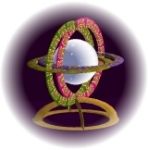
Bring Back The Magic

enjoying magic - even though it doesn't exist!
When I was a child I had a picture book - Rupert The Bear - and I used to look through it every night before going to sleep. A particular section fascinated me and I would turn to those pages to see what Rupert was up to, or whether he was there at all. You see, sometimes he was, at other times not. As my reading skills were fairly basic, there was no way of knowing if I was on the same page as the night before, except for the pictures, and they weren't always reliable because they kept changing. I don't recall being disappointed when I was unable to find Rupert, knowing without doubt that he would be back again sometime, hopefully next evening. Was this magic? I don't think I even considered the possibility - I didn't know what magic was then. There was no thought of asking my parents for a reason - that would have let them into my very own secret. Anyway, I was delighted that it kept happening without knowing why. I simply trusted, I believed. And that kind of belief made my world a wonderful place.
The beauty of magic is that it surpasses the rules of commonsense. It does, however, have rules of its own that are dependent on circumstances and the believer's integrity. The appearance and disappearance of the pictures in the Rupert book, only occurred for me at bedtime when I was alone in my room, but never during the day. This was a condition I had set down for the wonder to keep happening. I would not have dared to look for it at any other time, because that would have broken the spell and the pictures would never change again, never ever. At some period, I must have outgrown Rupert The Bear and the magic he performed, only recalling later on in life how the anticipation and discovery of those precious moments had made a little boy's bedtime so appealing. Now, as an adult, I am expected to shun magic and any kind of make-believe. But I can't do that, nor do I want to, and I suspect there are many like me. How often do ordinary, intelligent people trust in superstition - crossing fingers, carrying lucky charms, rubbing Budda's tummy when buying a Lotto ticket? Then there are the home-spun rules for success - following a specific routine, not one step out of place, or our team will lose the next game. None of these provisos can change the future or affect it in any way, and yet we put our faith in the most unlikely, the impossible. Despite the fact that it doesn't always work, we do it again and again. That's the way of magic - sometimes it happens, sometimes not. If it was predictable, it simply wouldn't be magic.
The continuing popularity of fantasy has to say something about our capacity to suspend disbelief. The events in Star Wars haven't happened yet, but we are happy to accept that they might. Even if George Lucas claimed his stories were simply an invention of his creative mind, they came from that part of him which delights in make-believe. And he appealed to the child in all of us, the naive, uncomplicated seeker of a wonder far beyond the boring sameness of our day-to-day lives. J K Rowling gave us Harry Potter. The character became an icon, and a geeky boy in glasses was our unlikely hero, one able to overcome impossible odds that would have overwhelmed ordinary folk like us. Harry, of course, had the advantage of magic. Who amongst us didn't wish for some of it, just a little to combat those up-and-coming trials that we knew were going to turn out disastrously? Thinking like this gives us an edge on the ones who can't - those whose lives are devoted to proving something exists before they can declare unequivocally that it truly does. We need people like them to positively define reality, to draw the line just so that we can cross it and experience the untrue, feel the magic.
As children we cherished excitement of the unknown, especially when it was nice and friendly; and even the scary stuff was stimulating. Monsters lurking under the bed or in the closet, and the shadows of goblins climbing the tree outside were our first appreciation of the difference between good and evil. They were awesome, but we learned to combat and overcome them, because our parents taught us how by employing rituals and chants, special remedies known only to the family. The amazing thing was that they worked, they must have, otherwise we wouldn't be here today. Eventually, we put away these childish thoughts, in particular the need to frighten ourselves half to death just so that we had an excuse to climb into bed with Mum and Dad. As adults, we know there were no gremlins lurking in the shadows. That being the case, why do we still insist on resurrecting them? We continue to read hair-raising books by Stephen King and watch creepy movies about vampires and demonic possessions. Are we simple-minded masochists, or just kids at heart trying to rekindle the exhilarating conflict between us and some supernatural force that can only be defeated by belief in ourselves and the hidden magic within every one of us?
Click this ![]() image to view or print complete article.
image to view or print complete article.
Money Health Focus Popcorn Recipes eBooks About Contact
copyright © 2011-2015 All Rights Reserved